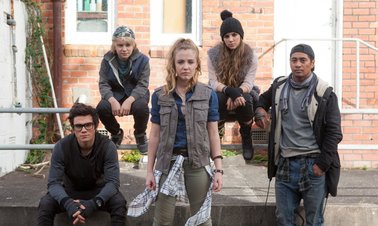
The Cul De Sac, Greenstone TV for TVNZ 2
We had a few questions for showrunner Stephen J Campbell about his creation.
You’ve built a career creating children’s content. What specifically appeals to you about making television drama for young people?
Making content for young people is fantastic fun. They're very open to new ideas and concepts - they're always looking for the next cool thing, but they are also brutally honest. If you miss the mark, they will not hesitate to tell you. However, if you do manage to engage them, they'll stay with you for the entire journey - or until the next cool thing comes along.
What makes The Cul De Sac a uniquely NZ drama?
The internet has given young kiwis instant access to the world. They see themselves as members of the global community and I think it’s important we reflect this in the stories we tell. The Cul de Sac is a universal story that places kiwi characters at the center of monumental global events.
The Cul de Sac still has a strong kiwi voice but that perspective isn’t forced upon the audience. Instead it is weaved into the fabric of the show, it is part of its DNA.
Why do you think it’s important to have local children’s drama on TV, particularly today with children having so many other entertainment options?
Well, to quote Whitney Houston, ‘children are our future’. The values we hand down to them today, shape the things to come.
There are a great many kiwi made shows for kids out there but sadly, dramas remain thin on the ground. Drama is such a powerful genre, it reaches out to audiences like no other. When I started in television audiences were still embarrassed to hear the kiwi accents spoken on screen. How sad is that? A country embarrassed to hear their own voice.
Then Shortland Street came along and that all changed. Shortland Street, a daily soap, put that dreadful cultural cringe to bed and helped us grow as a nation.
What do you see as the biggest challenges facing local drama production?
Funding is a constant challenge - there’s never enough dosh. (We agree – Ed.)
However I believe the biggest challenge facing local drama at the moment is the lack of diversity. If we want a truly robust local drama industry, we need to start investing in new ideas, new talent, new writers, directors and producers - we need to start taking some risks.